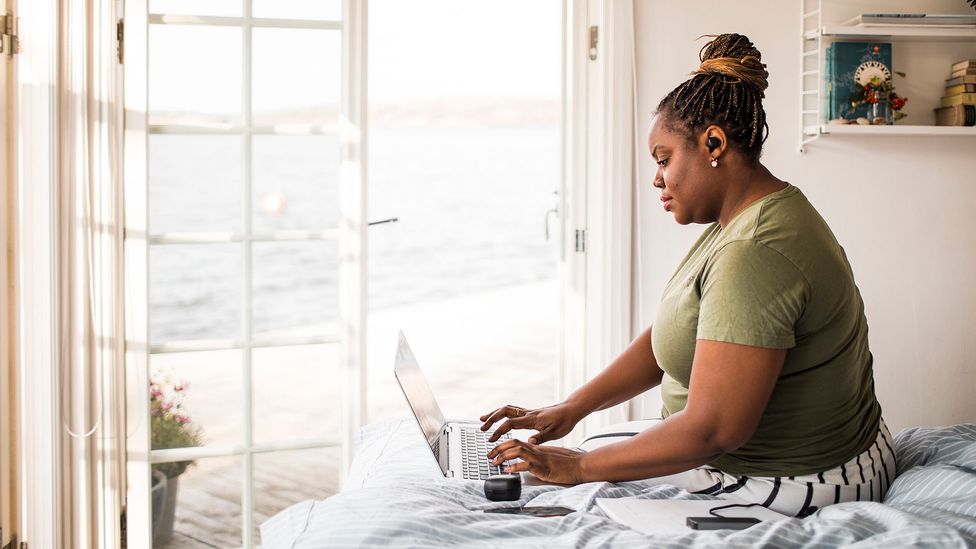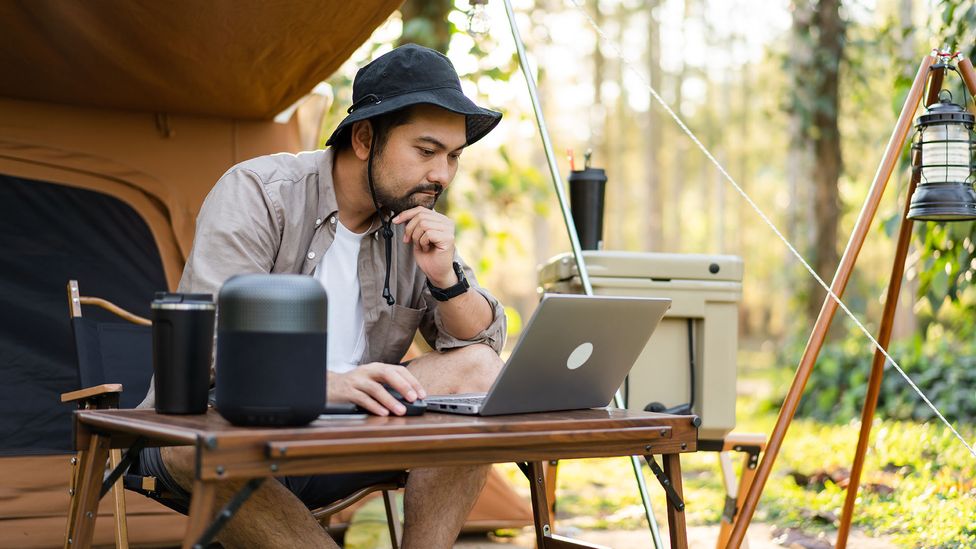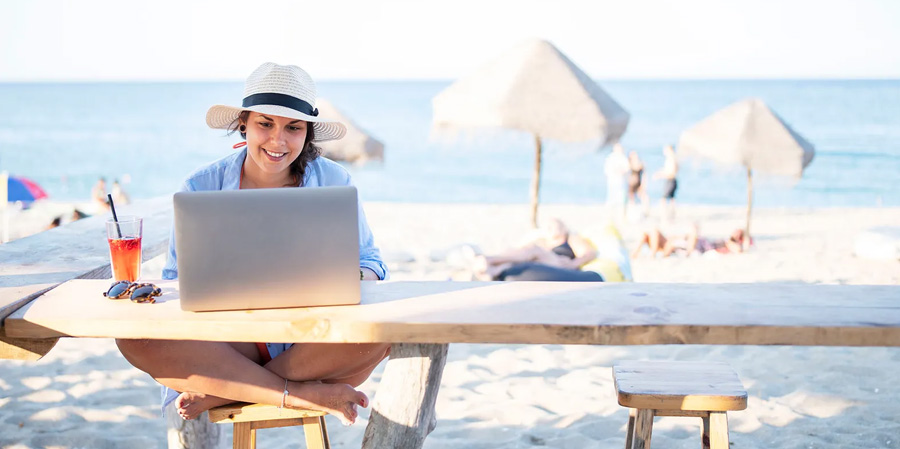We’ve been taught to keep work and play apart. Yet more of us are still taking workcations, years into the pandemic – and reaping the benefits. The trend could be here to stay.
“After working from home for over a year, I needed a change in atmosphere,” says Vedika Bhaia, a Kolkata-based marketing entrepreneur and content creator. Last summer, she and a friend went on a 15-day backpacking trip through India’s Parvati Valley, trekking between hostels, exploring the natural environment and paragliding – all while balancing a full workload on a laptop.
Though she was used to working remotely, Bhaia says the ‘work-from-anywhere’ mentality created by the pandemic pushed her to take a trip that combined work and leisure. “I knew travelling would do wonders for my mental health and help me overcome the creative block I was having,” she says.
Bhaia is not alone; ‘workcations’ are becoming entrenched in many nations. Workcations combine work and vacation – booking a mountain cabin for a week while working a full-time job remotely, for example – and became popular early in the pandemic, as many knowledge workers fled cramped apartments during lockdowns. Workcations are an evolution of ‘bleisure’: travel that combines business trips with leisure trips; think of the familiar practice of hanging around a city for an extra weekend after a conference, or tacking on some PTO days while you’re away on a business trip.
Now, in the third year of the pandemic, even as Covid cases fall globally, there’s no sign of workcations slowing down as companies continue to offer remote work policies. Last year, a whopping 85% of 3,000 Indian workers said in a poll that they took a workcation in 2021. Over a quarter of Canadian workers say they want to take one this year; in a global study of eight countries, 65% of 5,500 respondents say they plan to extend a work trip into a leisure one, or vice versa, in 2022.
Workcations may seem counter-intuitive – after all, better awareness of work-related mental health stressors has left us more conscious than ever of the importance of maintaining boundaries between our professional and personal lives. Yet experts argue that the adaptability we’ve developed during the pandemic has positioned us well to enjoy a break that combines work and play. And given the benefits workers see in them – like more chances to explore new places while fulfilling our day-to-day obligations – workcations look likely to become a permanent practice lasting well beyond the pandemic.

Remote workers headed to Airbnbs and cottages during the lockdowns of 2020; these ‘workcations’ have remained popular in the following years (Credit: Getty Images)
‘Recharged and re-enthused’
Before Covid-19, some white-collar workers were already taking advantage of bleisure travel. “I’m actually all for bleisure. I think it’s awesome. It gives people a chance to experience things they might not normally get a chance to experience,” says Martha Maznevski, professor of organisational behaviour at Western University, Canada. She regularly adds extra days to business trips, combining travel and relaxation with networking or developmental activities, like a cooking or language class.
What’s different now is that far more people can dip their toe into bleisure and workcations. Even if you don’t travel for business (and few of us are; business travel plummeted during the pandemic and isn’t expected to make a full recovery until 2024, partially due to companies avoiding health risks for employees), the fact that remote and flexible work is so much more entrenched means that people who used to spend all their time at their desks now have more scope to explore other options while fulfilling their professional responsibilities.
I think after the past two years, we can switch from one thing to the next very effectively – Rachel Fu
Andy Drane, a senior equity partner at an Edinburgh-based corporate and communications law firm, said he “wouldn’t have considered [a workcation]possible” before the pandemic. “Colleagues, clients and intermediaries would have expected me to be in the office 24/7 or visiting their places of work.” Now, he says, that’s been turned on its head. “The business has proven itself to be much more flexible than I’d anticipated.”
Drane went on a workcation last month to England’s Lake District. He was there to care for elderly family members but was also able to enjoy the location as he worked remotely. “I was able to have some downtime in a glorious environment and also to fit into a different pattern of days; taking longer over lunch, breaking earlier and cooking dinner for family, taking them on a couple of day trips,” he says. “I certainly came back recharged and re-enthused.”
Research released last month by a US travel services company suggest Drane’s experience is common. In a survey of 1,000 people who had taken a workcation, more than four-fifths of them felt the trip had boosted their productivity and creativity, and helped them cope with work-related stress. More than two-thirds said the purpose had been to recharge their mental and emotional batteries, while exploring new places also scored highly as a motivating factor.
‘We’ve all been trained to switch’
The apparent popularity of workcations may seem at odds with the deeply entrenched idea that we should keep work and play apart – and carefully ringfence time for each. After all, attempts by companies to bring ‘fun’ into the office – think ping pong tables, foosball, bean bags – have long been dismissed as gimmicky. But the key attraction with workcations is that workers are capitalising on new-found flexibility to combine work and play in a way that’s meaningful to them.
Maznevski and other experts see bleisure and workcations as an example of work-life integration, a concept they suggest is more realistic than striving for ‘work-life balance’, where work and play are positioned in competition. Opting to work from a cabin for a week means you’re deciding how, where and when you want to incorporate your leisure time into your work, rather than trying to keep the two realms separate. Maznevski points out that for centuries people lived and worked out of the home; only recently have we “been able to even conceive of something called ‘balancing’ those things”. Workcations, she suggests, could be our way of recognising “there are elements of work and life that integrate with each other”.
We’ve been trained to keep work and play separate, but experts say the pandemic has showed us how to integrate the two in ways many of us find meaningful (Credit: Getty Images)
Of course, there may well be some people who prefer to commit fully to either work or play, rather than combine the two activities. Rachel Fu, professor of tourism, hospitality and event management at the University of Florida, US, says that whether people enjoy the workcation experience will depend on “a variety of individual personalities and behavioural choices”; some may feel they are only on holiday if they are totally unplugged from work, for example.
But Fu suspects that many white-collar workers have developed the skills needed to pull off workcations during the pandemic. “Our behaviours have been forced to change,” she says. “Home is school, home is where we work. We have all been trained to switch: ‘OK, now we have a Zoom meeting’. I think after the past two years, we can switch from one thing to the next very effectively.”
That doesn’t mean that workcations should replace actual holidays, however. People need time away from work; workcations should complement paid time off, rather than serving as a substitute – otherwise, risk of work-related stress and burnout could increase. An Expedia survey released in February showed that while 78% of Americans aim to feel ‘unproductive’ during holiday, half bring their laptops and 41% dial into Zoom calls. Many are not happy about it: 61% of respondents said they didn’t consider trips which combined work and play to be proper holidays. This suggests that many people still value work-free vacations, but struggle to pull them off.
Workcations also raise equity issues, even after the pandemic further recedes; not everyone can work remotely or afford a week in rented accommodation. Increased workcations or bleisure “could actually create more of a divide in organisations between people who have location-specific jobs, and people who don’t”, warns Maznevski.
But she says the trend could also give people opportunities they might otherwise not get; whether that’s adding an extra day to a business trip to explore a city you never imagined visiting or boosting mental wellbeing through a week in a natural environment even though you’ve used all your paid holiday allocation.
Manage your expectations
Given the level of interest from workers now accustomed to staying productive in multiple environments, workcations look like a practice that’s here to stay. “As long as you deliver, many companies don’t care [where you’re working from],” says Fu. Accommodating workers will be in companies’ interests; it’s already clear that flexibility will be key to worker retention moving forwards, especially as the new generation of workers, in particular, value the ability to work from anywhere. According to a January 2022 survey conducted by Kayak and YouGov, 38% of Canadian Gen Z workers plan to take a workcation in 2022, Kayak tells BBC Worklife; a higher percentage than older cohorts.
Both Bhaia and Drane are planning on taking more workcations. In fact, Bhaia has already been on another 20-day workcation and has a new one planned for March. She points out that would-be workcationers need to go into their trip with realistic ambitions.
“You can’t go into a workcation expecting the rest and relaxation you get from a regular getaway,” she says. “Expect to be busy if you want to explore your surroundings while managing work at the same time.” She recommends planning ahead, taking longer stays to accommodate enough time for both work and play, and if you’re going with travelling partners, pick people who have the same goals as you. “Vacationers and workcationers don’t mix,” she cautions.
Drane says he used to think that the professional and the personal should be kept separate. But when changes to how we worked during the pandemic allowed him to combine doing his job with spending important time with his family in a rural environment, he became a workcation believer. “The beauty for me of the workcation,” he says, was that he was able to fulfil professional duties “whilst allowing me to spend meaningful time with my family”.
He’s booked his next workcation back to the Lake District for October, and says both he and his staff will continue to benefit from this new flexibility. “In the past, people often had to wait until retirement to do the things they’d dreamed of,” he says. “That’s no longer necessarily true, and I plan to take advantage of that.”
—
This article first appeared in www.warc.com
Seeking to build and grow your brand using the force of consumer insight, strategic foresight, creative disruption and technology prowess? Talk to us at +971 50 6254340 or engage@groupisd.com or visit www.groupisd.com/story




